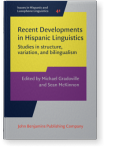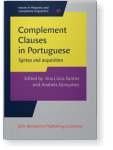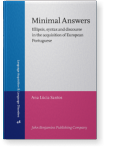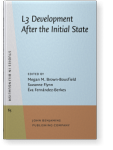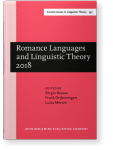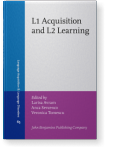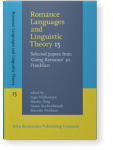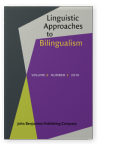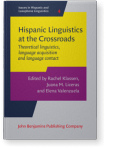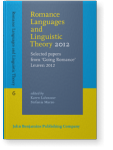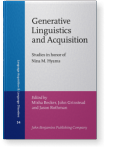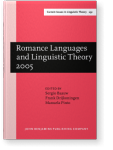Ana Lúcia Santos
List of John Benjamins publications for which Ana Lúcia Santos plays a role.
Book series
Titles
Complement Clauses in Portuguese: Syntax and acquisition
Edited by Ana Lúcia Santos and Anabela Gonçalves
[Issues in Hispanic and Lusophone Linguistics, 17] 2018. vi, 418 pp.
Subjects Language acquisition | Romance linguistics | Syntax | Theoretical linguistics
Minimal Answers: Ellipsis, syntax and discourse in the acquisition of European Portuguese
Ana Lúcia Santos
[Language Acquisition and Language Disorders, 48] 2009. xv, 296 pp.
Subjects Discourse studies | Language acquisition | Pragmatics | Romance linguistics | Syntax | Theoretical linguistics
2023 L3 acquisition of Portuguese clefts by L1-Mandarin L2-English speakers L3 Development After the Initial State, Brown-Bousfield, Megan M., Suzanne Flynn and Éva Fernández-Berkes (eds.), pp. 172–204 | Chapter
This study explored the trajectory of L3 acquisition (L3A) of three structurally different clefts in European Portuguese (EP) by L1-Mandarin Chinese (MC) L2-English learners, within the framework of the Feature Reassembly Hypothesis (Lardiere, 2008, 2009). This study also considers the… read more
2021 Chapter 2. Infinitival complement clauses: Data from L2 acquisition of European Portuguese Romance Languages and Linguistic Theory 2018: Selected papers from 'Going Romance' 32, Utrecht, Baauw, Sergio, Frank Drijkoningen and Luisa Meroni (eds.), pp. 25–48 | Chapter
Assuming the Feature Reassembly Hypothesis (FRH) (Lardiere 2008, 2009), we argue that the acquisition of Exceptional Case Marking (ECM), Inflected Infinitive Structures (IIS) and Prepositional Infinitival Structures (PIC) by Spanish learners of European Portuguese (EP) presents different… read more
2021 Chapter 4. Some thoughts on (the acquisition of) control L1 Acquisition and L2 Learning: The view from Romance, Avram, Larisa, Anca Sevcenco and Veronica Tomescu (eds.), pp. 83–108 | Chapter
This paper discusses the subject / object control asymmetry in child language acquisition. Based on data reflecting the acquisition of European Portuguese, I argue that children do not have an initial absolute preference for object control and that not only subject control but also object control… read more
2019 Chapter 2. Portuguese as a heritage language in contact with German and French: A comparative study on the acquisition of verbal mood Romance Languages and Linguistic Theory 15: Selected papers from 'Going Romance' 30, Frankfurt, Feldhausen, Ingo, Martin Elsig, Imme Kuchenbrandt and Mareike Neuhaus (eds.), pp. 35–52 | Chapter
This study focuses on the acquisition of verbal mood in complement clauses by two groups of heritage speakers of European Portuguese (EP) (7–16 years old) with similar sociolinguistic profiles and two different dominant languages, German and French. The production of finite complement clauses was… read more
2018 The acquisition of control in European Portuguese Complement Clauses in Portuguese: Syntax and acquisition, Santos, Ana Lúcia and Anabela Gonçalves (eds.), pp. 263–294 | Chapter
We offer a new insight on the acquisition of control, by considering data from Portuguese. We explore two main issues: (i) the distinction between obligatory control and non-obligatory control and (ii) choice of controller. Our results show that children distinguish certain obligatory and… read more
2018 Complement clauses in Portuguese: Some facts and open questions Complement Clauses in Portuguese: Syntax and acquisition, Santos, Ana Lúcia and Anabela Gonçalves (eds.), pp. 1–26 | Chapter
2018 The acquisition of infinitival complements to causative verbs in Mozambican Portuguese Complement Clauses in Portuguese: Syntax and acquisition, Santos, Ana Lúcia and Anabela Gonçalves (eds.), pp. 295–320 | Chapter
This chapter aims at analyzing the acquisition of complements to causative verbs in Mozambican Portuguese (MozP) as L1 by pre-school children. By presenting the results of a completion task (Santos, Gonçalves, & Hyams, 2016), we show that Mozambican children, like Portuguese ones, take… read more
2016 Comparing heritage speakers and late L2-learners of European Portuguese: verb movement, VP ellipsis and adverb placement Linguistic Approaches to Bilingualism 6:3, pp. 308–340 | Article
This study compares the performance of Portuguese-German heritage children and adult L2 speakers of European Portuguese whose L1 is German with respect to two aspects of grammar, adverb placement and VP-ellipsis, which depend on a core syntactic property of the language, verb movement. The… read more
2015 Sequence of tenses in complementation structures: Lexical restrictions and effects on language acquisition Hispanic Linguistics at the Crossroads: Theoretical linguistics, language acquisition and language contact, Klassen, Rachel, Juana M. Liceras and Elena Valenzuela (eds.), pp. 69–88 | Article
In this paper we discuss the combinations of tenses in main and complement clauses of European Portuguese, focusing on the issue that restrictions on the tenses allowed in complement clauses are observed with some predicates but not with others. We show that these lexical restrictions are… read more
2014 (Pseudo-)Inflected infinitives and Control as Agree Romance Languages and Linguistic Theory 2012: Selected papers from 'Going Romance' Leuven 2012, Lahousse, Karen and Stefania Marzo (eds.), pp. 161–180 | Article
This paper discusses the distribution of inflected infinitives in standard and non-standard European Portuguese. In the standard variety, inflected infinitives are generally available in non-obligatory control contexts, but can only occur in obligatory control contexts when the temporal orientation… read more
2013 Early or late acquisition of inflected infinitives in European Portuguese? Evidence from spontaneous production data Generative Linguistics and Acquisition: Studies in honor of Nina M. Hyams, Becker, Misha, John Grinstead and Jason Rothman (eds.), pp. 65–88 | Article
Building on our previous experimental work examining the acquisition of inflected infinitives in European Portuguese (EP) L1 acquisition (e.g. Pires, Rothman & Santos 2010, 2011; Santos, Duarte, Pires & Rothman 2011), the present study investigates the emergence of inflected infinitives in young EP… read more
2007 A poverty-of-the-stimulus argument for the innateness of the identification conditions on VP ellipsis Romance Languages and Linguistic Theory 2005: Selected papers from ‘Going Romance’, Utrecht, 8–10 December 2005, Baauw, Sergio, Frank Drijkoningen and Manuela Pinto (eds.), pp. 321–334 | Article
The co-existence in European Portuguese of Null Complement Anaphora and of VP ellipsis licensed by main verbs poses a learnability problem and ultimately provides a poverty-of-the stimulus argument for the innateness of the identification conditions on VP ellipsis. If the identification constraint… read more
